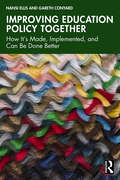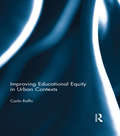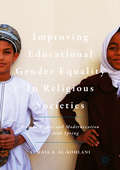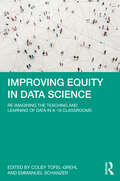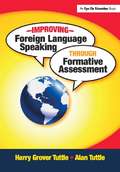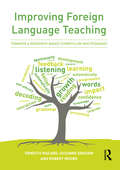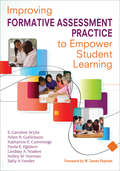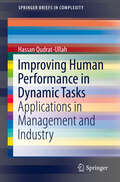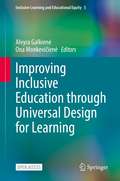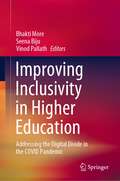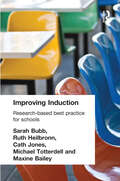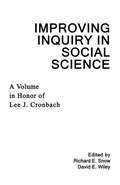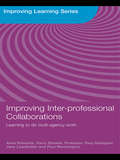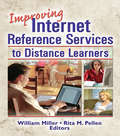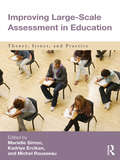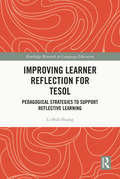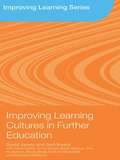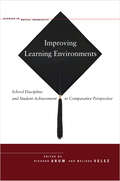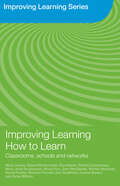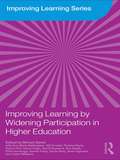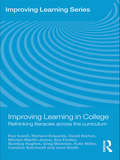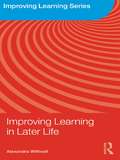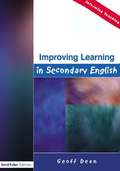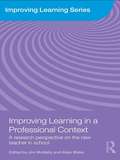- Table View
- List View
Improving Education Policy Together: How It’s Made, Implemented, and Can Be Done Better
by Nansi Ellis Gareth ConyardBy focusing on the relationships involved, Improving Education Policy Together will change how policy-making in education is approached and showcase alternative models that will lead to more sustainable and effective practices. The authors analyse the state of educational policy-making in England. They particularly reflect on the relationships of the different people and organisations involved – policy-makers such as politicians, civil servants, and unions – and explain how these interact with the wider world. Building on the experiences of the authors on different sides of the process, the book explores the reasons why education policies fail the very sector they are intended to serve. By considering aspects of policy-making in different countries, the authors highlight more effective ways of building relationships between decision-makers and those affected by educational policy. This book explores, as an alternative, long term, systems-led, and relational policy-making, and maps out a range of unique models for change. Of interest to those involved in developing and influencing policy in government, this book will be essential reading for political parties, unions, civil servants, and charities, as well as teachers and leaders who believe they should be much more influential in the policies that affect their working lives and seek to adopt a better approach to making education policy.
Improving Educational Equity in Urban Contexts
by Carlo RaffoAn enduring educational concern that has plagued researchers and policy makers in a number of affluent countries is the endemic nature of educational inequalities. These inequalities highlight distinct differences in the educational skills, knowledge, capabilities and credentials between learners’ demographic characteristics. They also point to issues of educational disadvantage that emanate from a combination of factors including family life, communities, the geographies of space and place, gender and ethnicity. This book examines some of the causes and responses to educational inequalities, and focuses upon poor urban contexts where educational disadvantage is at its most concentrated, and where educational policy and practice has, over time, proliferated. It questions how wider inequities experienced by young people in urban contexts generate educational inequalities and disadvantage, detailing explicitly what an equitable approach to education might look like. Included in the book is an innovative educational equity framework and toolkit with illustrative policy and practice case studies, bringing together unique scholarship and analysis to examine future educational policy in a holistic, comprehensive and equitable way. It will be valuable reading for postgraduate students, researchers and policy makers with an interest in education and educational equity.
Improving Educational Gender Equality in Religious Societies: Human Rights And Modernization Pre-arab Spring
by Sumaia A. Al-KohlaniIn this book, Al-Kohlani examines fifty-five Muslim and non-Muslim countries from 1960 to 2010 in response to “religious theory” that associates certain religions with gender inequality and “modernization theory” which downplays the role of religion on gender inequity and associates gender inequality with socioeconomic factors. The author explores both schools of thought and posits that, on average, Muslim countries have lower educational equality in comparison to non-Muslim countries with less religious constitution. An interdisciplinary study drawn from the fields of world politics, public policy in education, and political religion, this book responds not only to debates within academia, but also to larger debates in society about the role of religion in the state, the specific challenges of the relationship of Islam and the public policies, and the relationship between constitution and gender equality.
Improving Equity in Data Science: Re-Imagining the Teaching and Learning of Data in K-16 Classrooms
by Colby Tofel-Grehl Emmanuel SchanzerImproving Equity in Data Science offers a comprehensive look at the ways in which data science can be conceptualized and engaged more equitably within the K-16 classroom setting, moving beyond merely broadening participation in educational opportunities. This book makes the case for field wide definitions, literacies and practices for data science teaching and learning that can be commonly discussed and used, and provides examples from research of these practices and literacies in action. Authors share stories and examples of research wherein data science advances equity and empowerment through the critical examination of social, educational, and political topics. In the first half of the book, readers will learn how data science can deliberately be embedded within K-12 spaces to empower students to use it to identify and address inequity. The latter half will focus on equity of access to data science learning opportunities in higher education, with a final synthesis of lessons learned and presentation of a 360-degree framework that links access, curriculum, and pedagogy as multiple facets collectively essential to comprehensive data science equity work.Practitioners and teacher educators will be able to answer the question, “how can data science serve to move equity efforts in computing beyond basic inclusion to empowerment?” whether the goal is to simply improve definitions and approaches to research on data science or support teachers of data science in creating more equitable and inclusive environments within their classrooms.
Improving Foreign Language Speaking through Formative Assessment
by Harry Grover Tuttle Alan TuttleWant a quick way to get your students happily conversing more in the target language? This practical book shows you how to use formative assessments to gain immediate and lasting improvement in your students’ fluency.You’ll learn how to: Imbed the 3-minute formative assessment into every lesson with ease Engage students in peer formative assessment successfully Teach students to give each other formative feedback Help struggling students make significant gains Create and coach small groups for differentiated speaking practice Assist students in incorporating current grammar lesson into meaningful conversations Analyze your own use of language in the classroom to avoid vague feedback that can stifle student conversations Grade oral improvement positively The authors provide formative assessments for 17 language functions with step-by-step lesson plans, aligned to ACTFL guidelines. Each plan includes a wealth of conversation and extension activities. There are ready-to-use checklists including the "I Can" log that helps students plot their own progress. Research has confirmed that when teachers use formative assessment, students can learn in six to seven months what would normally take a school year to learn. You’ll find yourself using this book every day because of the gains your students will achieve in foreign language fluency.
Improving Foreign Language Teaching: Towards a research-based curriculum and pedagogy
by Suzanne Graham Ernesto Macaro Robert WooreImproving Foreign Language Teaching provides teachers and teacher trainers with a research-based structure for the effective teaching and assessment of second languages. As well as outlining a model for teacher development, the book identifies and exemplifies eight key principles for effective language learning, which can be used to guide curriculum design and decisions about classroom pedagogy. Improving Foreign Language Teaching also presents practical activities, related materials, and guidance on how student progress can be monitored and recorded. Based on the research of the authors and other international experts, together with the work of a consortium established by the authors and teachers in a range of secondary schools, the book focusses on the development of language skills and communicative competence. It also proposes an assessment system which better reflects how learners progress in language learning than current models. Taking as its starting point the challenge of a curriculum in flux and complex pedagogical approaches, this book offers clear research-informed guidance for effective planning, teaching and learning. It will be essential reading for all those concerned with the improvement of language learning and teaching in the secondary classroom.
Improving Formative Assessment Practice to Empower Student Learning
by E. Caroline Wylie Dr Arlen R. Gullickson Katharine E. Cummings Paula E. Egelson Lindsay Akers Noakes Kelley M. Norman Sally A. VeederSupercharge your formative assessment skills and watch student learning soar! The authors describe an effective four-step process for improving teachers’ formative assessment practices that provides opportunities to reflect, consider alternative instructional approaches, and apply what they have learned. The text suggests that teachers ask themselves the same questions they ask students: <p><p> Where am I going? <p> What can formative assessment practice look like? <p> Where am I currently in my formative assessment practice? <p> How do I close the gap? <p> Included are case studies, examples of formative assessment in practice, and a companion website with tools and templates.
Improving How Universities Teach Science: Lessons from the Science Education Initiative
by Carl WiemanToo many universities remain wedded to outmoded ways of teaching. Too few departments ask whether what happens in their lecture halls is effective at helping students to learn and how they can encourage their faculty to teach better. But real change is possible, and Carl Wieman shows us how it can be done—through detailed, tested strategies.
Improving Human Performance in Dynamic Tasks: Applications in Management and Industry (SpringerBriefs in Complexity)
by Hassan Qudrat-UllahThis book is about improving human decision making and performance in complex, dynamic tasks. The defining characteristics of a dynamic decision task are that there are a number of decisions required, that decisions are interdependent and that the environment in which the decision is made is transient and feedback is pervasive. Examples of dynamic tasks include the sustainable management of renewable resources and how businesses might allocate resources for research and development (R&D) projects. Decision making in dynamic tasks can be improved through training with system dynamics–based interactive learning environments (ILE’s) that include systematic debriefing. Some key features of the book include its didactic approach, numerous tables, figures, and the multidimensional evaluative model. Researchers can use the developed “evaluation model” to gauge various decision-aiding technologies. How to Improve Human Performance in Dynamic Tasks appeals to those interested in the design and evaluation of simulation-based decision support systems, as well as policy makers, students, researchers, and industrialists concerned by the issue of improving human performance in organizational tasks.
Improving Inclusive Education through Universal Design for Learning (Inclusive Learning and Educational Equity #5)
by Alvyra Galkienė Ona MonkevičienėThis open access international scientific study provides an analysis of how the educational strategy of Universal Design for Learning can stimulate the process of inclusive education in different educational-cultural contexts and different areas of the educational system. The findings of the research deepen the conception of inclusive education and present an analysis of factors that are significant for developing the educational system as well as providing evidence-based recommendations for educational practice.The research for this work was done in four European countries with various historical-cultural contexts: Lithuania and Poland underwent a transformation of the educational systems at the turning point in their political system, shifting from a strictly centralized Soviet policy to a liberal and democratic education system; Austria has experienced changes in social stratification and a need for cultural harmonisation arising from active national migration processes, whereas Finland has been gradually developing a socio-democratic model of national welfare. The analysis of the educational processes in the four countries has been performed using a qualitative action research method. The researchers, in cooperation with the teachers from the selected schools in their country, have implemented the strategy of Universal Design for Learning and assessed its transformation indicators in terms of the quality of inclusive education components.
Improving Inclusivity in Higher Education: Addressing the Digital Divide in the COVID Pandemic
by Bhakti More Seena Biju Vinod PallathThis book addresses issues of access that COVID-19 brought forth in higher education, with a primary focus on Asian countries. In looking to address SDG4 to promote “inclusive and equitable quality education for all”, the volume explores the challenges relating to educational exclusion by considering how specially-abled students have been impacted by the digital divide in the context of the pandemic. It puts a spotlight on the approaches, experiences, and case analyses from various geographies in the region to study transitions in inclusivity. Universities and institutes of higher education have had to reconsider their digital offerings and services all the more since the onset of the pandemic, but have, in many instances, failed to fully account for how Internet access can be limited, unavailable, or unaffordable for many students. As a result, specially-abled learners – students without sufficient technological resources, such as those living in remote areas where there are little or no Internet facilities – have been, however unintentionally, neglected. While universities implemented their own practices, processes and policies to reach, and teach, disadvantaged learners, they had to further adapt these strategies, re-aligning them to meet the unprecedented circumstances, and concomitant needs, of specially-abled learners – and there is still much more to do. This book consolidates regional perspectives on how to work towards goals of inclusivity, and bridge the digital divide, looking into, and beyond, the conditions of the pandemic. Relevant to scholars and policymakers, this book is of interest to those focused on digitisation and the transition to the ‘new normal’ in higher education.
Improving Induction: Research Based Best Practice for Schools
by Sara Bubb Ruth Heilbronn Cath Jones Maxine Bailey Michael TotterdellInduction - the first year of a teacher's career - is a crucial, and potentially difficult, period. This book is the work of a well-known and highly respected team of experts on the subject and is based on a comprehensive nationwide research project into the implementation and effectiveness of the latest statutory regulations covering induction in England. It includes not only findings from this research, but also numerous ideas from, and examples of, best practice. Including case studies from primary and secondary schools, in the state and private sectors, this book raises awareness of the complexities entailed in inducting new teachers, addresses the issues, dilemmas and problems of induction and celebrates the achievements of the national induction policy. Its insights provide an invaluable guide to the effective implementation of induction in schools.
Improving Inquiry in Social Science: A Volume in Honor of Lee J. Cronbach
by David E. Wiley Richard E. SnowThis volume celebrates Lee J. Cronbach's considerable contributions to the methodology of social and behavioral science. Comprised of chapters written by colleagues and contemporaries of the highly influential scholar, it offers a range of ideas, perspectives, and new approaches to improving social science inquiry.
Improving Inter-professional Collaborations: Multi-Agency Working for Children's Wellbeing (Improving Learning)
by Anne Edwards Harry Daniels Jane Leadbetter Tony Gallagher Paul Warmington** Shortlisted for the NASEN Special Educational Needs Academic Book Award 2009 ** Inter-professional collaborations are invaluable relationships which can prevent the social exclusion of children and young people and are now a common feature of welfare policies worldwide. Drawing on a four year study of the skills and understanding required of practitioners in order to establish the most effective interagency collaborations, this comprehensive text Gives examples from practitioners developing inter-professional practices allow readers to reflect on their relevance for their own work Emphasises what needs to be learnt for responsive inter-professional work and how that learning can be promoted Examines how professional and organisational learning are intertwined Suggests how organisations can provide conditions to support the enhanced forms of professional practices revealed in the study Reveals the professional motives driving the practices as well as how they are founded and sustained Full of ideas to help shape collaborative inter-professional practice this book shows that specialist expertise is distributed across local networks. The reader is encouraged to develop the capacity to recognise the expertise of others and to negotiate theor work with others. This book is essential reading for practitioners in education and educational psychology or social work, and offers crucial insights for local strategists and those involved in professional development work. The book also has a great deal to offer researchers working in the area of cultural historical activity theory (CHAT). The four year study was framed by CHAT and offers a well-worked example of how CHAT can be used to reveal sense-making in new practices and the organizational implications of enhanced professional decision-making. As well as being important contributors to the developing CHAT field, the five authors have worked in the area of social exclusion and professional learning for several years and have brought inter-disciplinary strengths to this account of inter-professional work.
Improving Internet Reference Services to Distance Learners
by William Miller Rita PellenIn their efforts to provide distance learners with the most effective services possible, librarians and information specialists are working more and more with faculty in academic departments, IT departments, and other librarians at cooperating institutions. Improving Internet Reference Services to Distance Learners chronicles how those efforts have seen librarians become actively involved in online course management and delivery systems, particularly Blackboard, Desire2Learn, and WebCT, or by "embedding" themselves into the online course structure to better learn where students need assistance. This invaluable resource also examines how librarians use Internet resources to support professional and continuing education and to establish university-wide information and referral services to provide quality service to distance learners.Improving Internet Reference Services to Distance Learners encourages librarians to think more broadly about working with "outside" individuals when designing and providing reference and other services to nontraditional users. The book examines why it&’s best to consider user needs, funding, staff management, and collaboration development when planning Internet reference services, how to develop and implement a required, credit-bearing online information literacy course, and how to apply effective marketing techniques from the business world to increase awareness of reference support services available to distance learners. It also offers a look at the Walden University Library at Indiana University-Bloomington, which "houses" no print collection-only online databases-and includes case studies that document the design and development of Internet reference services for the University of Illinois&’ Fire Service Institute, and the efforts to provide support for doctor of pharmacy students at the University of Wisconsin-Madison in their final year of study. Improving Internet Reference Services to Distance Learners provides practical information on: monitoring online discussion threads devoted to library research Web-based interactive tutorials integrating library services in support of coursework integrating library services into online courses offering, promoting, and providing instruction to public users, as well as local and distance students developing a web site that centralizes information about library services and resources the potential of the academic library to be the central provider of information and referral services for an entire universityImproving Internet Reference Services to Distance Learners is an invaluable resource for librarians working in academic, school, special, and public settings, and for library science faculty and students.
Improving Large-Scale Assessment in Education: Theory, Issues, and Practice
by Kadriye Ercikan Marielle Simon Michel RousseauLarge-scale assessments (LSAs) play a growing role in education policy decisions, accountability, and education planning worldwide. This book focuses on central issues that are key components of successful planning, development and implementation of LSAs. The book’s main distinction is its focus on practice- based, cutting-edge research. This is achieved by having chapters co-authored by world-class researchers in collaboration with measurement practitioners. The result is a how-to book whose language is accessible to practitioners and graduate students as well as academics. No other book so thoroughly covers current issues in the field of large-scale assessment. An introductory chapter is followed by sixteen chapters that each focus on a specific issue. The content is prescriptive and didactic in nature but based on the most recent scientific research. It includes successful experiences, exemplary practices, training modules, interesting breakthroughs or alternatives, and promising innovations regarding large-scale assessments. Finally, it covers meaningful topics that are currently taking center stage such as motivating students, background questionnaires, comparability of different linguistic versions of assessments, and cognitive modeling of learning and assessment.
Improving Learner Reflection for TESOL: Pedagogical Strategies to Support Reflective Learning (Routledge Research in Language Education)
by Li-Shih HuangPresenting comprehensive research conducted with learners and educators in a range of settings, this volume showcases self-reflection as a powerful tool to enhance student learning. The text builds on empirical insights to illustrate how language professionals can foster critical self-reflection amongst learners of English as an additional language. This text uses ecologically sensitive practitioner research that addresses issues of both practical and pedagogical significance in the fields of TESOL, language teaching and learning, and teacher education. By synthesizing interdisciplinary research and theory, chapters show how various types of self-reflection—including guided and non-guided; group and individual forms; and written, oral, and technology-mediated reflection—can promote autonomous, self-regulated learning amongst students at various levels. Whilst offering readers a strong grounding in the theoretical and empirical knowledge that supports self-reflection, the volume gives constant attention is given to praxis, with a focus on effective pedagogical strategies and tools needed to implement, encourage, and evaluate critical learner reflection in readers’ own teaching or research. This volume will be a critical resource for language-teaching professionals interested in critical learner reflection, including in-service, pre-service, and teacher educators in the field of TESOL. Scholars and researchers in the fields of applied linguistics and language education more broadly will find this volume valuable.
Improving Learning Cultures in Further Education (Improving Learning)
by David James Gert BiestaThrough its unique theoretical framework - a cultural understanding of teaching and learning – this book develops a new way of understanding educational improvement, one which focuses on the formation and transformation of the practices through which students learn. Based on detailed ethnographic research of seventeen learning sites in further education colleges, this book generates a unique insight into a wide variety of practices of teaching and learning. Illustrated by case studies, it is structured around three key questions: what do learning cultures in FE look like and how do they transform over time? how do learning cultures transform people? how can people (tutors, managers, policy makers, but also students) transform learning cultures for the better? Through a combination of theory and analysis, Improving Learning Cultures in Further Education makes a strong case for the importance of a cultural approach to the improvement of teaching and learning in further education, and provides practical guidance for researchers, policymakers and practitioners for implementing change for the better.
Improving Learning Environments: School Discipline and Student Achievement in Comparative Perspective (Studies in Social Inequality)
by Richard Arum and Melissa VelezImproving Learning Environments provides the first systematic comparative cross-national study of school disciplinary climates. In this volume, leading international social science researchers explore nine national case studies to identify the institutional determinants of variation in school discipline, the possible links between school environments and student achievement, as well as the implications of these findings for understanding social inequality. As the book demonstrates, a better understanding of school discipline is essential to the formation of effective educational policies. Ultimately, to improve a school's ability to contribute to youth socialization and student internalization of positive social norms and values, any changes in school discipline must not only be responsive to behavior problems but should also work to enhance the legitimacy and moral authority of school actors.
Improving Learning How to Learn: Classrooms, Schools and Networks (Improving Learning)
by Mary James Sue Swaffield Dylan Wiliam Paul Black Robert McCormick Joanna Swann Patrick Carmichael Bethan Marshall John MacBeath Alison Fox Richard Procter Mary-Jane Drummond David PedderLearning how to learn is an essential preparation for lifelong learning. Whilst this is widely acknowledged by teachers, they have lacked a rich professional knowledge base from which they can teach their pupils how to learn. This book makes a major contribution to the creation of such a professional knowledge base for teachers by building on previous work associated with ‘formative assessment’ or ‘assessment for learning’ which has a strong evidence base, and is now being promoted nationally and internationally. However, it adds an important new dimension by reporting the conditions within schools, and across networks of schools, that are conducive to the promotion, in classrooms, of learning how to learn as an extension of assessment for learning. There is a companion book, Learning How to Learn in Classrooms: Tools for schools (also available from Routledge), which provides practical resources for those teachers looking to put into practice the principles covered in this book.
Improving Learning by Widening Participation in Higher Education (Improving Learning)
by Ann-Marie Bathmaker Sue Heath Pauline Davis Julian Williams Diane Reay Gill Crozier Anna Vignoles Geoff Hayward Gareth Parry Miriam David Alison Fuller Hubert Ertl Chris HockingsImproving Learning by Widening Participation in Higher Education presents a strong and coherent rationale for improving learning for diverse students from a range of socio-economic, ethnic/racial and gender backgrounds within higher education, and for adults across the life course. Edited by Miriam David, the Associate Director of the ESRC’s highly successful Teaching and Learning Research Programme, with contributions from the seven projects on Widening Participation in Higher Education (viz Gill Crozier and Diane Reay; Chris Hockings; Alison Fuller and Sue Heath; Anna Vignoles; Geoff Hayward and Hubert Ertl; Julian Williams and Pauline Davis; Gareth Parry and Ann-Marie Bathmaker), this book provides clear and comprehensive research evidence on the policies, processes, pedagogies and practices of widening or increasing participation in higher education. This evidence is situated within the contexts of changing individual and institutional circumstances across the life course, and wider international transformations of higher education in relation to the global knowledge economy. Improving Learning by Widening Participation in Higher Education also considers: the changing UK policy contexts of post-compulsory education; how socio-economically disadvantaged students – raced and gendered – fare through schools and into post-compulsory education; the kinds of academic and vocational courses, including Maths, undertaken; the changing forms of institutional and pedagogic practices within higher education; how adults view the role of higher education in their lives. This book, based upon both qualitative studies and quantitative datasets, offers a rare insight into the overall implications for current and future policy and will provide a springboard for further research and debate. It will appeal both to policy-makers and practitioners, as well as students within higher education.
Improving Learning in College: Rethinking Literacies Across the Curriculum (Improving Learning)
by David Barton Richard Edwards Kate Miller Roz Ivanic Marilyn Martin-Jones June Smith Zoe Fowler Buddug Hughes Greg Mannion Candice SatchwellWhat's the problem with literacy at college? How might everyday literacy be harnessed for educational ends? Based on the first major study of literacy practices in colleges in the UK, this book explores the reading and writing associated with learning subjects across the college curriculum. It investigates literacy practices in which students engage outside of college, and teaching and learning strategies through which these can help support the curriculum. With insightful analyses of innovative practices, it considers ways of changing teaching practices to enable students to draw upon their full potential. Recent research work has challenged the myth of individual student deficit, arguing cogently that people have ‘funds of knowledge’ from diverse and vibrant cultural roots, and that these have been misguidedly disqualified by the education system. It has claimed that different ‘ways with words’ can provide valuable resources for learning. However, the empirical exploration of this claim has lagged far behind the theoretical debate. Improving Learning in College resolves this by showing the integrity and richness of the literacy practices of a significant population, not previously the focus of such research: those who take vocational and academic college courses in colleges. It addresses an issue which has not until now been developed within this research tradition: that of how these practices can not only be valued and validated, but mobilised and harnessed to enhance learning in educational settings. This book will interest all teachers, teacher-educators and researchers concerned with post-compulsory education and vocational education in compulsory schooling.
Improving Learning in Later Life (Improving Learning)
by Alexandra WithnallWith life expectancy increasing, there is growing emphasis on encouraging older people to continue learning. This comes as part of a strategy to allow them to remain healthy, independent and vitally engaged in society for as long as possible. All the same, policymakers have barely begun to address the issues involved and the perspectives of these learners. This book presents insightful research that will help shift the focus of debate onto the learning experiences of older people themselves. It offers a critical overview of the development of theoretical and philosophical approaches to later life learning that have developed over the last three decades, drawing on published work from the USA, the UK, Australia and other countries. It documents the individual experiences of older people through a variety of methods, including: Focus group discussions Learning diaries kept by older people Questionnaires considering, among other issues, older people’s definition on what learning is Interviews and commentary This material gives a sense of the breadth and diversity of older people’s experiences, as well as the enormous range of learning activities, both informal and formal, in which they are engaged in retirement. In a climate of debate and change concerning the provision and funding of non-vocational learning opportunities for adults of any age, this study’s findings will be of particular importance. It will appeal to researchers and students of education as well as those directly involved in the implementation of courses and classes involving older learners.
Improving Learning in Secondary English (Informing Teaching)
by Geoff DeanFocusing on how teachers can improve the ways in which they plan their lessons, this book demonstrates how careful planning allows the further development of learning approaches. The author presents a clear understanding of how these approaches can be used by the teacher to assess themselves and their students’ learning through: careful consideration of how certain approaches to learning can improve a student’s grasp of reading, writing, speaking and listening discussions on how theories and research from leading experts can be applied in the classroom advice on how to use government strategies and ultimately work beyond them to develop learning in the classroom an examination of learning for children of different abilities. Helping teachers to develop good practice and understanding of learning in a familiar subject context, this book is essential for all those concerned in the teaching of secondary English.
Improving Learning in a Professional Context: A Research Perspective on the New Teacher in School (Improving Learning)
by Jim McNally Allan BlakeImproving Learning in a Professional Context provides vital new evidence on exactly how teachers learn to be teachers; evidence that is likely to affect and influence the profession for many years to come. Demonstrating that learning in schools is more than simple ‘cognitive’ knowledge of the curriculum and teaching skills, this book suggests that we need to pay more attention to the emotional, relational, ethical, material, structural and temporal dimensions of the teaching experience. Based on empirical research, including interviews with new teachers, by teachers themselves, on a scale rarely seen before, the book reveals the complexity of learning in a professional context and gives some basic truths about what really matters in teaching. This book offers a fundamental critique of policy but also the prospect of constructive change for the better as the authors present accounts of what the ‘real’ experience of beginning teaching may be like, as well as lines for future research. Key questions are answered, such as: Do we really understand what beginners go through in the workplace? What is the experience of new teachers as they join one of the largest workforces in the developed world? What do teachers learn in the school, one of our universal institutions? Becoming a teacher is a transformative search by individuals for their teaching identities and, with this book, teachers and teacher educators can at last begin to understand this complex developmental process. IMPROVING LEARNING SERIES The Improving Learning series supports evidence-informed professional practice and policy-making in education. Each book showcases findings from the Teaching and Learning Research Programme (TLRP) - one of the world’s largest coordinated educational research initiatives. For those with a commitment to the improvement of outcomes for learners, these books are essential reading.
